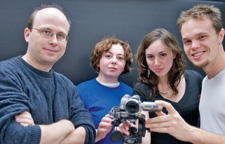History lives for Steven High’s class
Students learn oral history techniques

Steven High with students Florence Panné, Allison Smith and Sean Ireson. High, a new Canada Research Chair, originally developed his passion for oral history at Lakehead University, in his native Northern Ontario, and later when he did his doctorate at the University of Ottawa on the deindustrialization of the 1970s and ’80s.
Photo by Andrew dobrowolskyj
“Most historians try to learn by consulting sources from the past. Oral historians do the same thing, but we tie it to living people.
“Ordinary people have extraordinary stories to tell.”
Although he just arrived at Concordia’s History Department last summer, Steven High has wasted little time getting its first oral history course off the ground. His expertise has earned him a Tier 2 Canada Research Chair in Public History.
Although European cultures abandoned oral history with the invention of the printing press, many cultures, such as Canada’s First Peoples, maintain a rich oral tradition that goes back hundreds of years.
As part of a class project, High’s students are recording interviews with people at a homeless shelter, members of the black community in Little Burgundy and members of a Roman Catholic parish near Little Italy.
“These are all people whose voices are not often heard. By recording and trying to convey what they say, we give dignity and value to their stories,” High said.
Before meeting them, however, the students spent a month learning how to identify potential interviewees as well as interview techniques and ethical considerations.
Allison Smith’s first interview with her subject started while they served dinner together at the Old Brewery Mission, where he lives and volunteers. Jim has been homeless for about 10 months, she said.
“He’s had a crazy life. He was a lighting technician for bands in the 70s and has been all over the world. He was so proud of his interviews. He kept addressing the camera as ‘Concordia,’ and giving advice to students who might see it.”
“Always honour the interviewee. You’re not there to judge.”
Other subjects request more privacy. Florence Panné, a French international student, said her interview subject at the Mission wanted only his voice recorded. He also uses a pseudonym.
She suggested that his identity wasn’t as important as what he had to say. “We don’t think we going to change the situation of the homeless, but we can open a window into it.
“He just has a very sad story.”
All the subjects involved in the project can refuse to answer questions they are uncomfortable with, and can withdraw at any time. High said it’s part of a tradition of complete deference to the person whose life is being documented.
“Always honour the interviewee. You’re not there to judge the interviewee: You’re there to understand them,”
Sometimes easier said than done. As an example, he cited the work of Kathleen Blee, an American academic who has extensively interviewed mem-bers of the Ku Klux Klan.
“It’s very easy to judge them. Perhaps you should, but it’s perhaps more important to understand them. It helps us understand history and what motivates people to join racist organizations.”
After a few more interviews, High and his students will hit the editing suites. The short films and sound documentaries that result will be publicly presented. And the subjects will be guests of honour.
